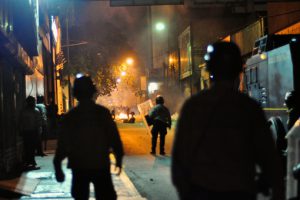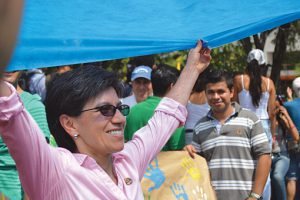The United States Restricts Travel for Top Venezuelan Officials
The U.S. has issued a travel ban for a list of unnamed Venezuelan officials who are accused of involvement in human rights abuses after the Venezuelan military and police cracked down on anti-government protests earlier this year. The ban affects 24 high-ranking officials from Venezuela, ranging from cabinet members and senior judiciary members to members … Read more

From the Think Tanks
Human Rights Watch, Brookings Institution, Corporación de Estudios para Latinoamerica The Venezuelan government’s response to the protests that began on February 12, 2014, led to accusations of human rights abuses. In its report, “Punished for Protesting: Rights Violations in Venezuela’s Streets, Detention Centers, and Justice System,” Human Rights Watch analyzes 45 allegations of abuses perpetrated … Read more

Political Innovator: Claudia López
Claudia López fled Colombia in October of 2013 after receiving death threats for her investigative reporting on the so-called parapolítica network that linked her country’s politicians with paramilitary groups. “Yesterday, I left the country as a preventative measure,” López wrote to her Twitter followers. “I will return when the police and the inspector general do … Read more
Former Chávez Aid Detained in Aruba
Caracas announced yesterday its opposition to the “illegal and arbitrary” arrest of former Venezuelan general, Hugo Carvajal in the Dutch-administered Caribbean island Aruba. While Carvajal–ex-director of military intelligence in Venezuela and personal advisor of late Venezuelan President Hugo Chávez–awaited his approval as consul in Aruba, he was detained on Wednesday night at the request of the U.S. government for his … Read more
Monday Memo: Colombian Legislature – Argentine Debt – Peruvian Environmental Law – Deaths in Nicaragua – Bolivian Child Labor
This week’s likely top stories: Colombia inaugurates a new legislature; Argentina must pay its debt by July 30; Reforms to Peru’s environmental agency are criticized; Five Nicaraguans are killed after a Sandinista anniversary celebration; Bolivia allows those as young as 10 to work. Colombia installs new legislature: As Colombia’s new legislature was sworn in on … Read more
Eleven Arrested in World Cup Ticket Scalping Operation
Police dismantled a World Cup ticket scalping operation with the arrest of 11 individuals in Rio de Janeiro and São Paulo in a raid Tuesday night. After a three-month investigation, twenty search warrants were granted and police raided a mansion in Santa Mônica, Barra da Tijuca, seizing close to $10,000 reais and 100 World Cup … Read more
Bachelet Government Clarifies Position on Abortion
Chilean Minister of Health Helia Molina set out on Thursday to clarify the government’s position on legalizing therapeutic abortion—abortion only in cases of rape, putting the life of the mother at risk, and the inability of the fetus to live outside of the womb. Molina said that the government was not promoting a law that … Read more
Bogotá Institutes Dry Law to Stem Soccer-Related Violence
A ley seca (dry law) announced by Bogotá Mayor Gustavo Petro on Wednesday was extended until 6 am this morning. Petro justified the implementation of the law citing the violence that erupted after Colombia’s opening World Cup game against Greece on June 14—the South American nation’s first tournament appearence in 16 years. Despite liquor sales … Read more
The Political Relevance of Gangs in El Salvador
The approach adopted by former President Mauricio Funes’ administration to combat crime is probably the least popular crime control strategy in Central America’s northern triangle. Salvadorans first learned details of the strategy in March 2012, when news reports suggested that the government of El Salvador had negotiated a drop in homicides with gang leaders who, … Read more
Ecuador’s Ex-President Wanted by Interpol
Interpol issued a warrant for the arrest of former Ecuadorian President Jamil Mahuad on Tuesday for embezzlement, mishandling of public funds and causing the country’s banking crisis in the late 1990s. Mahuad became president in 1998 when Ecuador was on the brink of war with neighboring Peru over a territorial dispute. Mahuad and then Peruvian president … Read more
Additional Reforms Needed in Colombian Mining Sector
Exportation in Colombia has been, and remains, a significant driving factor for large-scale mineral exploration, extraction and production by multinational corporations. According to the Banco de la República, the Colombian mining sector contributed to a record high proportion of the country’s total exports in 2011 and 2012, at 71 percent. Fossil fuels especially constituted an … Read more
Revisiting Capital Punishment in the United States
The botched April 29 execution of Oklahoma inmate Clayton Lockett made headlines throughout the world, leading to appeals to either abolish capital punishment in the United States or revisit the methods used to execute by lethal injection (in this case, the nature of the drugs). Since 1976 (after a brief suspension of the death penalty … Read more
Brazil Signs Internet Bill of Rights into Law
Brazilian President Dilma Rousseff signed an Internet Bill of Rights into law yesterday—the first of its kind in the world. The new bill ensures the privacy of its users by restricting the amount of metadata that can be collected and also prohibits companies from restricting certain services by requiring the user to pay more, such … Read more
Will Mexico’s Telecom Reform Hurt Internet Freedom?
On March 24, Enrique Peña Nieto presented the Mexican Senate with a bill for a new telecommunications law that complements the constitutional reforms he approved in 2013. The legislation proposes, among other things, to promote competition in the sector, improve telecom services, and regulate the radioelectric spectrum through the new telecommunications regulator, the Instituto Federal … Read more
Contested Lands, Contested Laws
Read more about proposals for regulation here. The right to free, prior and informed consent (FPIC), or consulta previa, has expanded throughout South America. Nine states have ratified the International Labour Organization’s Convention 169 (ILO169)—the principal treaty regarding consulta previa.* But regulations created by four of those states—Colombia, Chile, Peru, and Ecuador—contradict the commitments they … Read more


